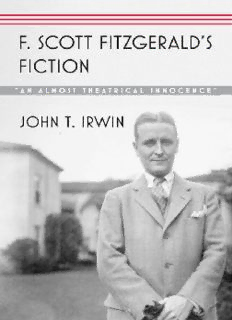
F. Scott Fitzgerald's Fiction: "An Almost Theatrical Innocence" PDF
Preview F. Scott Fitzgerald's Fiction: "An Almost Theatrical Innocence"
F. Scott Fitzgerald’s Fiction This page intentionally left blank F. Scott Fitzgerald’s Fiction “An Almost Theatrical Innocence” John T. Irwin Johns Hopkins University Press Baltimore © 2014 Johns Hopkins University Press All rights reserved. Published 2014 Printed in the United States of America on acid-free paper 2 4 6 8 9 7 5 3 1 Johns Hopkins University Press 2715 North Charles Street Baltimore, Maryland 21218-4363 www.press.jhu.edu Library of Congress Cataloging-in-Publication Data Irwin, John T. F. Scott Fitzgerald’s fiction : “an almost theatrical innocence” / John T. Irwin. pages cm Includes bibliographical references and index. isbn 978-1-4214-1230-6 (hardcover : acid-free paper) — isbn 978-1-4214-1231-3 (electronic) — isbn 1-4214-1230-6 (hardcover : acid-free paper) — isbn 1-4214-1231-4 (electronic) 1. Fitzgerald, F. Scott (Francis Scott), 1896–1940— Criticism and interpretation. I. Title. ps3511.i9z668 2014 813'.52—dc23 2013018547 A catalog record for this book is available from the British Library. Special discounts are available for bulk purchases of this book. For more information, please contact Special Sales at 410-516-6936 or [email protected]. Johns Hopkins University Press uses environmentally friendly book materials, including recycled text paper that is composed of at least 30 percent post-consumer waste, whenever possible. As always, for Meme, my beloved, and for the twins Matthew and Sophia Saccone in hopes that one day they may receive as much enjoyment from reading Fitzgerald’s fiction as their Nonno has This page intentionally left blank contents Preface ix Acknowledgments xi one Compensating Visions in The Great Gatsby 1 two Fitzgerald as a Southern Writer 10 three The Importance of “Repose” 33 four “An Almost Theatrical Innocence” 86 five Fitzgerald and the Mythical Method 158 six On the Son’s Own Terms 194 Works Cited 219 Index 223 This page intentionally left blank preface The present book completes a trilogy examining the work of four writers, each of whom, I contend, had been influenced in a special way by Platonic ideal- ism. The first two volumes—The Mystery to a Solution: Poe, Borges, and the Analytic Detective Story and Hart Crane’s Poetry: “Appollinaire lived in Paris, I live in Cleveland, Ohio”—appeared in 1994 and 2011, respectively. This third volume, while addressing the overall topic of the trilogy, is also the result of a professional lifetime spent studying and teaching the works of my favorite twentieth-century American fiction writer, F. Scott Fitzgerald. For a variety of reasons, as I’ve tried to make clear in the following chapters, Fitzgerald’s work has always deeply moved me. And this is as true now as it was fifty years ago when I first picked up The Great Gatsby. I can still remember the occasions when I first read each of his novels, remember the time, place, and mood of those early readings, as well as the way each work seemed to speak to some- thing going on in my life at that moment. Because the things that interested Fitzgerald were the things that interested me and because there seemed to be so many similarities in our backgrounds, his work always possessed for me a special, personal authority; it became a form of wisdom, a way of knowing the world, its types, its classes, its individuals. One of the most powerful emotional effects of The Great Gatsby that has grown with each passing year is that sudden swelling of the spirit its most po- etic passages (the end of chapter 6 and the end of the last chapter) produce, an effect resembling that created when the Andante theme in Gershwin’s Rhap- sody in Blue (written during the same year Fitzgerald was finishing Gatsby) suddenly emerges, its serene beauty set off by the more frenetic earlier part of the work, a feeling of discovery and rediscovery: “So this is what it sounds like to be an American”—this soaring ambition, this spaciousness, this hope of an infinite second chance. Nick Carraway describes Gatsby’s imagination as “gorgeous,” but I have always felt that that was Fitzgerald describing his own prose. When Yeats edited The Oxford Book of Modern Verse in the late 1930s,
Description: